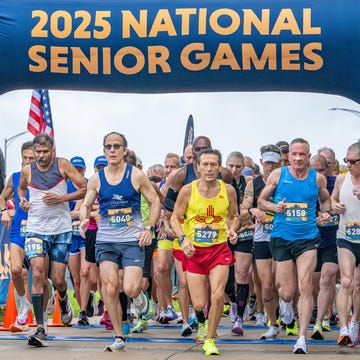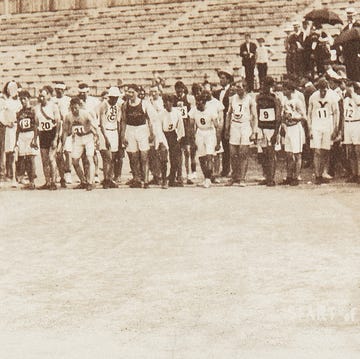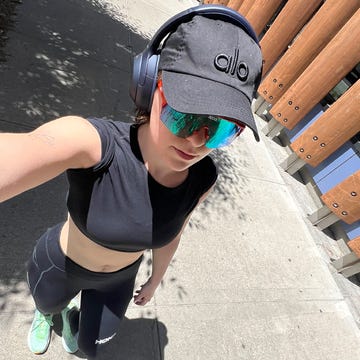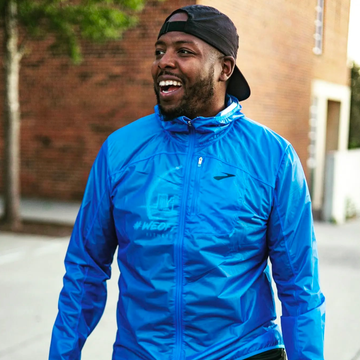Professional triathlete Sika Henry has never shied away from new challenges. After spending several years working to qualify for her pro card and becoming the first Black American woman to do so in May 2021, she shifted toward a new focus of ultramarathons.
Henry’s first was the 2021 JFK 50 Mile in Maryland. Nearly a year later, after deciding to take a break from triathlon, she set a record of 8:34:20 with her win at the Dismal Swamp 100K in Chesapeake, Virginia.
It seems the endurance built from triathlons—with its back-to-back-to-back swim, cycle, and run—work better for Henry than a straight-up marathon.
“I think I’m more mentally strong and can endure a lot for a really long period of time, which I think I developed from triathlon,” Henry tells Runner’s World.
Henry’s success at Dismal Swamp set the stage for her next ultramarathon endeavor: the Comrades Marathon, a 90-kilometer race and the world’s oldest ultramarathon in South Africa, taking place on June 11. (The race course, which alternates between Durban and Pietermaritzburg each year, will be run “down” this year.) Henry will be racing as an elite with the Durban-based Phantane Athletics Club, a partnership that came after she met some athletes at last year’s Ironman World Championship in Kona, Hawaii. In addition to the fact that the club will provide her with bottle and fluid support at the race, Henry was also enthused about representing them after learning about how they work to identify talent and give back to underprivileged athletes in South Africa.
Henry’s buildup for Comrades included the Dismal Swamp 100K and an early 2023 marathon at Houston. Next up was the Boston Marathon, where she received a special invitation to race as part of a team along with Alisa Harvey, Ingrid Walters, and Shawanna White to represent Marilyn Bevans, who is known as a pioneer for women’s distance running as the first Black American woman to have broken 3 hours in the marathon.
“[Bevans] has been a bit of an idol of mine for quite some time—one of the reasons why I chased a sub-3-hour marathon was to be part of ‘The List’ [of Black American women who have hit the milestone],” Henry says. “So to come back years later and have all these other races and everything under my belt, it was an honor to get to represent her.”
Henry ended up finishing Boston in 3:08:30 after going in with the plan to use the race as a training run for Comrades by holding a 7:15 to 7:30 pace. Henry found that she was nailing it until she hit mile 21, where Pioneers Run Crew and TrailBlazHers Run Co. were stationed. Henry went on to run the last miles at 6:30- to 6:40 pace, negative-splitting the race by 3 minutes.
“I hit that point and they were so loud,” she says. “It was an adrenaline rush with everybody cheering and you can’t help but get excited.”
With Comrades being more than 55 miles in distance, it makes sense to have factored in a couple of marathons as long training runs.
But even so, Henry has always been a lower-mileage athlete in terms of run volume, especially because she has to fit in her training during her lunch breaks from her full-time job as a corporate analyst at Ferguson Enterprises. Henry also supplements swimming and cycling in her buildups that aren’t specifically geared toward triathlons. She’s maxed out at around 55 miles per week during this training cycle, having also hit 70 once leading up to Dismal Swamp.
Henry finds that her triathlon training is another way she stays injury-free during these training cycles, as the swimming and cycling help work different muscle groups.
As the first-ever professional Black female triathlete and an ambassador for the Ironman Foundation, Henry is also passionate about boosting representation at endurance events, especially knowing the elite field at Comrades is still largely white as well, and that Black runners weren’t even allowed to participate until 1975.
“It’s kind of fun to bring attention to certain sports, especially endurance sports, where we’re not really seen and introduce something new to people who look like me that didn't know that existed,” she says.
Henry is most looking forward to the crowds of spectators and the race’s iconic finish in the Hollywoodbets Kingsmead Stadium, which has changed this year after finishing at Moses Mabhida Stadium for the last two “down” runs.
“[I’ve heard] that finish is even more spectacular than finishing on the red carpet at Kona and I'm dying to see if that's actually the case,” Henry says, “because I can't imagine anything being better than that.”

Emilia Benton is a Houston-based freelance writer and editor. In addition to Runner's World, she has contributed health, fitness and wellness content to Women's Health, SELF, Prevention, Healthline, and the Houston Chronicle, among other publications. She is also an 11-time marathoner, a USATF Level 1-certified running coach, and an avid traveler.













